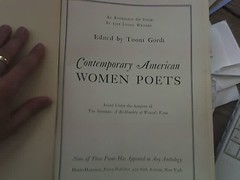I'm very happy to have this book from 1936, "Contemporary American Women Poets." To me it reads like poems all in the same or similar registers, mostly formalist, but on a deliberately wide variety of subjects, so they don't all come from the same position (a common fault of anthologies). Yet there is something huge missing - an experimentalness - a flair - diversity - range. It reads like it's all poetry that was to one person's taste.
I prefer the approach taken by María Monvel in her 1930 "Poetisas de América". She puts in poems by poets she likes, yes. But she also puts in stuff she doesn't like. She bluntly makes fun of it, or makes little digs about how it comes off as old-fashioned, or it's trying too hard to be experimental, ultraist, or new at the expense of quality, or she makes it plain that she disagrees with the poem's politics when it's all about communist revolution. But she put them in for a specific reason: to represent the diversity of work being written by women. By the standards of "that kind of work" -- communist ultraist poems, or romantic epic effusions -- the poets she chose are representing, and are good. She put them together in order not to deny their existence; out of honesty. "Contemporary American Women Poets" lacks that dimension of honesty, and doesn't represent diversity, and so gives a false cross-section of "how women were writing" at that particular time.
That's why I like people I don't like! I'm a junkie of difference! Anything else is *not truth* and is oversimplified. If you can look through a lot of different windows at the same thing, then why limit yourself to only one window, one filter, to reality!
Thursday, June 29, 2006
Subscribe to:
Post Comments (Atom)








No comments:
Post a Comment